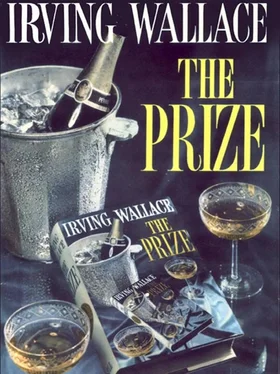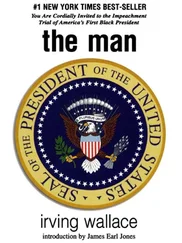The novel had its roots in history. Somewhere, Craig had read that the philosopher, Plato, having advanced his radical ideas for a Utopia to his students, in the suburban grove known as the Academy, had once been given the opportunity to practise what he had so long preached in his thirty-six Dialogues. In Syracuse, capital of Sicily, the new, twenty-five-year-old dictator, Dionysius II, had been prevailed upon to invite Plato to reform both the dictator and his government. In 367 B.C., Plato travelled to Syracuse to install Utopia. Not only did he attempt to establish a constitutional monarchy, but he tried to introduce the perfect socialized state-the Republic-where men were to be directed into certain occupations by elimination tests. The most brilliant were to continue their study of philosophy until the age of fifty, when they would be made rulers, and would live on together, without personal advantage or gain, in common quarters; children were to be taken from their parents at birth and raised by the state; women to be emancipated and allowed careers, and permitted to marry only under eugenic control; foreign trade was to be eliminated; profits to be curbed so that no single individual might acquire more than four times the wealth of the average man.
This was the perfect state that Plato had intended to experiment with in Syracuse. Dionysius II was horrified by the philosopher’s suggestions. He rebelled, sold the hapless Plato into slavery, and returned to his beloved autocracy, his drinking, and his lechery. Meanwhile, Plato was ransomed from his slavery by a pupil, Anniceris, and he returned to Athens and the Academy, considerably disillusioned, and determined to keep his Utopia theoretical thereafter.
Working from these few facts, Craig constructed the plot of his first novel. It was narrated as if the action were seen through the eyes of the young student, Anniceris, as he accompanied his teacher and hero, Plato, to Syracuse to inaugurate a formal Utopia. Taking licence with history, Craig had Plato actually put his reforms into practice. Skilfully, he showed that it was not Dionysius II who undermined Utopia, but the people themselves. Plato’s philosophic communism fought a losing battle against human nature. Men did not want their life’s work enforced and inflexible, and they did not wish limits to their incentive and their income. Women did not want love scientifically controlled, and did not wish their offspring taken from them and raised by the state. In the novel, as Utopia disintegrated all about him, even Anniceris’s faith in his master and the perfect state was shaken. In the end, after saving Plato from the fury of the mob, Anniceris returned to Syracuse, thus symbolizing man’s preference for individual freedom, despite its attendant ills.
Although his novel was laid in 367 B.C., Craig deliberately aimed his shaft at twentieth-century Communism. While the tale was a drama of ancient times, it was the perfect transmitting agent for Craig’s deepest inner feelings about the spreading ideas of Marx and Engels. The novel was published shortly after Craig’s second wedding anniversary. The reviewers welcomed it as a minor classic, one told with controlled wit, magnificent irony, and bursts of passion. But its setting, so remote in time, and its subtle allegory had little appeal to the mass of readers. There were two printings, totalling 7,500 copies, and there were no more. Craig had his literary foothold, his cult, and his meagre savings account.
It took Craig two years to produce his second book, because he was constantly stopping and starting again, forced to write formula short stories in between, to keep Harriet and himself alive. The second novel was The Savage . Again, Craig embellished a factual character and incident. The novel was set in 1782, and the hero was Simon Girty, a fierce and angry American frontiersman, who abandoned his people to become a white Indian and an Indian chief and to lead Shawnee redskins on raids through Ohio, Kentucky, Pennsylvania, and Virginia. History knew Girty for a brutal renegade. Craig saw him as something more, as a nonconformist and a defender of a lost cause. When he wrote of Girty, Craig was writing of all men, in all times, but especially in his own time, who invite crucifixion by crusading against injustice.
With this book, Craig did not make his point at all. His agent, his publisher, his reviewers, his readers, could not see what he was driving at. They saw only the surface story-an exciting, roughneck hero, an action plot, a slice of Americana, a superior Western-and that was more than enough. The novel sold 22,000 copies in hardback; it sold for a modest sum to a new paperback reprinter; it sold for $50,000 to a major motion picture studio.
The total income from The Savage was not a fortune, but even after taxes, it was sufficient to liberate Craig from the tiresome short stories. Creatively, he was bursting with projects. One, especially, appealed to him. If he could carry it off, he knew it would be a tour de force. He called it The Black Hole , and lunching at the Twenty-One club, he told it to his publisher. The framework, he explained, was historically accurate. In 1756, India rose up against the British. The new Indian ruler, nineteen-year-old Siraj-ud-daula, too young to be merciful, captured 146 English fugitives from the garrison and imprisoned them in a Calcutta military cell only 18 by 14 feet in size. In his novel, Craig wanted to dramatize the hell of that one June night in the Black Hole of Calcutta, what the calvary did to men’s characters and souls, why 23 survived the night, and how they survived it, and why 123 did not survive it, and how they died. This much Craig related to his publisher, and no more. What he withheld was the theme that lurked behind the mask of history: a polemic against colonialism and white superiority. The publisher’s enthusiasm knew no bounds, and the advance he offered was a generous one.
The Girty windfall had freed Craig from magazines; the current advance freed him from New York. Both Harriet and he had grown weary of New York, and both were filled with new life, she with the embryo of their child that she did not wish to raise in the city, and he with the new novel that had grown in his mind. Also, he had become tired of his New York literary set. He had finally agreed with George Bernard Shaw’s remark to John Galsworthy that ‘literary men should never associate with one another, not only because of their cliques and hatreds and envies, but because their minds inbreed and produce abortions.’
For months, he and Harriet had spoken wistfully of a town in Wisconsin, once visited while driving to Madison to see Harriet’s sister Leah at the university. After four years in New York, Miller’s Dam seemed the fairest paradise. When the money from The Black Hole came in, the Craigs impulsively pulled up stakes and moved back to their Midwestern beginnings.
Miller’s Dam was situated sixty miles north-west of Milwaukee. Riding inland from Lake Michigan, the countryside rose and fell gracefully, like long, lazy ocean swells. This was rich earth, rural earth, and every hillock seemed alive with small living things unseen. The actual landscape that year was bright, clear, and unvaried, except for the occasional billboards and road signs pointing to a petrol station or hamburger shack that erupted among the endless windmills and red barns, yellow haystacks, fields of bending cornstalks, and herds of speckled cows grazing indolently on the dry green slopes.
Suddenly, homesteads filled the landscape, and they were in Miller’s Dam (pop. 1,475), a cluster of shops, a drugstore, a sheriff’s station, a hotel, a bank, a pool hall, a theatre, all bisected by the little-travelled cement highway. The town was worked in, but not lived in, except for the familiar travelling salesmen in the hotel and the few old couples who dwelt in the rear of their stores. Almost everyone lived on the fringes of the town, where vacant land was plentiful, in two-storey flats or bungalows with front porches, or farther out, on parcels of worked farmland. Harriet and Andrew Craig conformed, and were glad to do so because they wanted space. They bought the Hartog house, a big stucco-and-frame structure, on two acres, located three miles north of Main Street on Wheaton Road.
Читать дальше












